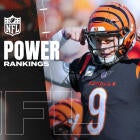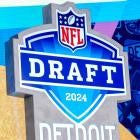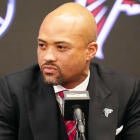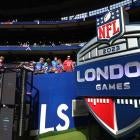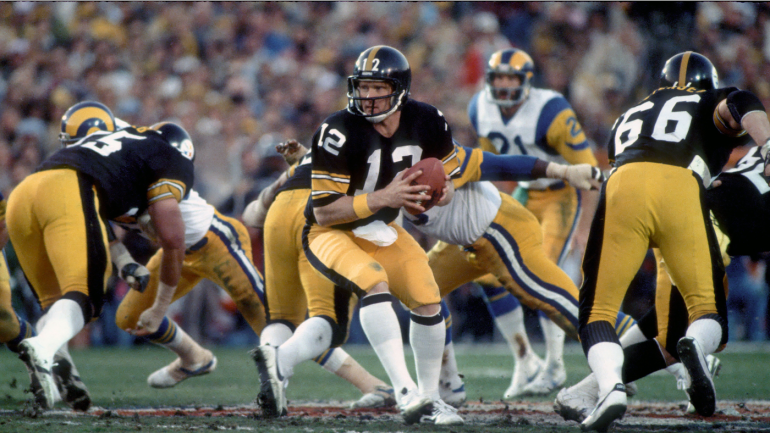
While they've already set their sights on a three-peat, the Kansas City Chiefs made history this season by joining an elite group of NFL teams who successfully defended their Super Bowl title. The Chiefs are only the ninth team to do so in the 58-year history of the Super Bowl.
How does this Chiefs team stack up with the previous eight repeat winners? It's tough to say, given that seven of the previous eight repeat winners played in an era where the salary cap's impact on rosters was either minimal or non-existent. The majority of the previous back-to-back champions built dominant rosters that weren't chipped at by free agency or salary caps.
Using the following criteria, I was still able to rank the back-to-back based on the following criteria.
- Overall record
- Roster talent
- Strength of opponent
- Enduring legacy
So, where do the Chiefs rank? Let's find out.
1. 1972-73 Dolphins
Miami went 32-2 over this span that included its undefeated 1972 team. That team boasted the league's top-ranked scoring offense and defense, an extreme rarity in football history.
The Dolphins had two 1,000-yard running backs, a dominant offensive line, a Hall of Fame receiver and quarterback, and a "No Name" defense that allowed just one total touchdown in Super Bowls VII and VIII. This team truly had no weakness, but if you want try to find one, you could point to the fact that the Dolphins didn't have the most prolific passing offense, but a lot of that because of that era and the fact that Miami was so good running the football.
2. 1978-79 Steelers
Pittsburgh's roster boasted 10 Hall of Fame players, including quarterback Terry Bradshaw, who over this two-year span won two Super Bowl MVPs and one league MVP. Bradshaw's emergence as a prolific passer is the reason why the '78-79 Steelers teams are ahead of the 74-45 squads. At Bradshaw's disposal were two Hall of Fame wideouts (Lynn Swann and John Stallworth), HOF running back Franco Harris and arguably the greatest center of all-time in Mike Webster.
While not as good as they were in the early '70s, the Steelers' defense was still an elite group, led by Joe Greene, Jack Lambert and Mel Blount, who won a combined four Defensive Player of the Year awards. The Steelers' defense helped Pittsburgh defeat the decade's other elite team, the Dallas Cowboys, in Super Bowl XIII in a game that determined which team would hold the mantle as the Team of the '70s.
3. 1966-67 Packers
Vince Lomardi's team remains the last team to win three straight NFL titles. The first title was won just before the start of the Super Bowl era. Green Bay won the NFL title in 1965, then proceeded to win the first two Super Bowls by a combined score of 68-24.
Like the '70s Steelers, the '60s Packers' roster was filled with future Hall of Fame players. The '65 and '66 teams had 11 Hall of Famers that included a whopping six on defense alone. The offense featured the devastating "Packer Sweep" that featured HOF RB Jim Taylor. The fact that the Packers played in the pre NFL-AFL merger era was the biggest reason why they aren't higher.
4. 2003-04 Patriots
New England showed that dynasties can still exist in the free agency/salary cap era. Led by Tom Brady and Bill Belichick, the Patriots won an NFL record 21 straight games during this span.
Brady, who was in the early stages of his legendary career, was complemented by a defense that shut down Peyton Manning and the rest of the Colts' prolific offense in the '03 and '04 playoffs. These Patriots teams could beat you in a shootout (see Super Bowl XXXVIII) or in a defensive duel. They took on all comers in that included Manning's Colts, Kurt Warner's Rams, Ben Roethlisberger's Steelers and Donovan McNabb's Eagles.
5. 1992-93 Cowboys
Dallas had arguably the best offense the NFL has ever seen, led by the triples of Troy Aikman, Emmitt Smith and Michael Irvin. Defensively, the Cowboys were grossly underrated. The unit allowed a paltry 15.2 points per game in 1992 and just 14.3 points an outing in 1993.
What gave this team the nod over the teams behind it was the fact that the Cowboys defeated a very talented 49ers team in consecutive NFC title games. They then whiplashed the four-time AFC champion Bills in Super Bowl XXVII and XXVIII.
6. 1997-98 Broncos
Denver's back-to-back run included an historic Super Bowl win over the defending champion Packers that snapped the AFC's 13-year Super Bowl losing streak. Terrell Davis took center stage in that game by rushing for 157 yards and three touchdowns despite missing nearly the entire second quarter with a migraine.
The Broncos' flipped the script on the Falcons in the next year's Super Bowl. With Davis serving as a decoy, John Elway won Super Bowl MVP honors in what was the final game of his Hall of Fame career. Denver's defense played big in both games. They forced two big turnovers of Brett Favre in Super Bowl XXXII and didn't allow the Falcons' offense to score a touchdown until garbage time in Super Bowl XXXIII.
7. 1988-89 49ers
This team would be higher if not for its 10-6 record during the 1988 season. In that year's Super Bowl, the 49ers found themselves in a dog fight against an inferior Bengals team before Joe Montana and Jerry Rice led one of the greatest game-winning drives in Super Bowl history.
OK, now that we've gotten that out of the way, let's give this team their flowers. They won back-to-back Super Bowls despite Bill Walsh stepped down after the '88 season. The 49ers' players responded by going 17-2 in 1989 that included the biggest blowout win in Super Bowl history (a 55-10 win over the Broncos). San Francisco's offense was elite, but so was its defense. It allowed 26 total points in the playoffs, with seven of those points occurring when Super Bowl XXIV was already in the bag.
8. 2022-23 Chiefs
Kansas City showed its resolve by winning back-to-back Super Bowls after trading arguably the league's best receiver in Tyreek Hill. The Chiefs were able to overcome that loss largely by the play of Patrick Mahomes, who over the last two years has solidified his place as one of the greatest quarterbacks of all-time.
The '22 Chiefs dethroned the defending AFC champion Bengals before winning a shootout against a talented Eagles team in Super Bowl LVII. This past season, the Chiefs started 9-6 before embarking on a run that ended with them winning the longest Super Bowl ever. They did so by leaning on Mahomes, tight end Travis Kelce and a defense that made several big stops during this run.
9. 1974-75 Steelers
Pittsburgh's lack of a consistent passing attack was the main reason why the Steelers' first back-to-back run is taking up the rear. The Steelers' QB situation was a mess for most of 1974 before Bradshaw took the reins for good late in the regular season. Bradshaw still largely leaned on Franco Harris and the running game in those days, but he did complete some big passes that included several to Lynn Swann in Super Bowl X.
While the offense was still finding its way, Pittsburgh's Steel Curtain defense was at the peak of its powers. The unit shut out the Vikings' offense in Super Bowl IX and picked off Roger Staubach three times while sacking him seven times in Super Bowl X.














